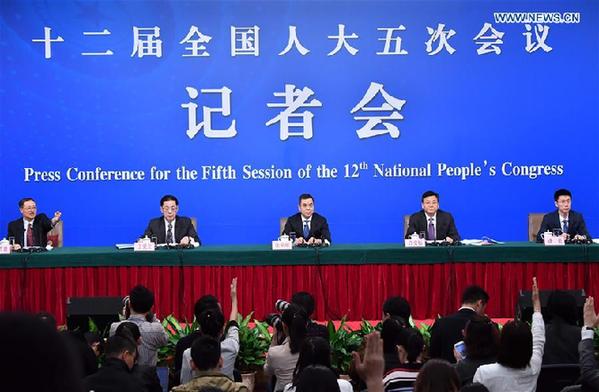Why do we need a civil code?
- By Ji Weidong
 0 Comment(s)
0 Comment(s) Print
Print E-mail China.org.cn, March 10, 2017
E-mail China.org.cn, March 10, 2017
|
|
|
Zhang Rongshun and Xu Anbiao, vice-chairmen of the Legislative Affairs Commission of the National People's Congress (NPC) Standing Committee, and Wang Aili, director-general of the Office of Criminal Laws of the Legislative Affairs Commission of NPC Standing Committee, take questions on the draft general provisions of civil law and legislation of the NPC at a press conference for the fifth session of the 12th NPC in Beijing, capital of China, March 9, 2017. (Xinhua/Li Xin) |
The ongoing annual sessions of China's National People's Congress (NPC) reviewed a draft of the General Principles of the Civil Law on March 8. Ji Weidong, a jurist and dean of the Koguan Law School of Shanghai Jiaotong University, writes about the long journey China has taken in drafting a civil code and why it is necessary for the country to have one. China.org.cn has edited and translated part of his analysis.
It is quite extraordinary that China does not have a civil code 68 years after the People's Republic's foundation and 25 years after it established a socialist market economy.
The country made several attempts from the 1950s to 1980s to formulate a civil code, but the effort was halted because of changes in its social system. Later the top legislature decided to make individual civil laws and integrate them into a civil code.
China adopts statute laws, therefore the lack of a civil code compromises the boundary between public and private laws and the clarity of rights and obligations for individuals. We need a high-standard civil code that fits with the changes of the current century.
This round of civil code formulation started with the Fourth Plenary Session of the 18th Central Committee of the Communist Party of China in October 2014, when the compilation of the civil code was formally announced.
According to the Legislative Affairs Commission of the NPC Standing Committee, there will be two steps in compiling the civil code. The first is to stipulate the code's general principles, and the second is to comprehensively integrate civil laws.
The draft of the general principles made its first public appearance in July last year, when the country's legislature solicited opinions from the public. The NPC Standing Committee had three readings of the draft last year. This time marks its fourth review.
We are paying close attention to the formulation of the civil code, especially its general principles, because of the two following reasons.
First, some of the basic rights of citizens outlined in the Constitution need to be enshrined in the civil law to be better protected. A civil code, especially its general principles, is the fundamental law on the economic and social fronts, and should be the legal expression of human rights. In addition, apart from the traditional rights of property and family relations, other rights related to intellectual property and information -- for instance the right of privacy -- have become increasingly important in recent years, and hence need to be written into the civil law.
Second, the core values of a modern civil code are freedom and equality, which are originally a breakaway from the fetters imposed on individuals in the Middle Ages. In China, nearly four decades of reform and opening-up have brought increasingly complicated property relations, which need to be justified by the systems and values in the civil law. In this sense, the general rules of the civil code should map out a blueprint for societal transition. The civil code, which is essentially the charter of a market economy, is more relevant with a universal audience than other law systems. Of course, the blueprint that China has in mind is different from what can be seen in modern Western Europe. China's civil code will not be about abstract individual citizens, but demonstrate the features of a diversified social integration.
Ji Weidong is dean of the Koguan Law School of Shanghai Jiaotong University.
The article was translated by Zhang Lulu and its original unabridged version was published in Chinese.
Opinion articles reflect the views of their authors, not necessarily those of China.org.cn.







Go to Forum >>0 Comment(s)